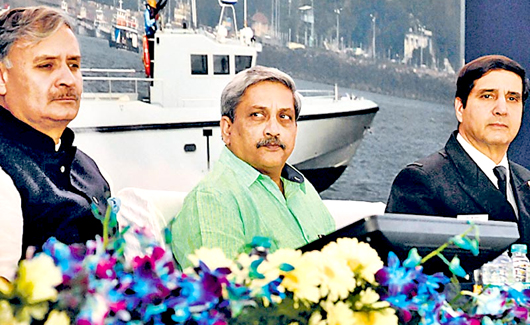New Delhi, Dec 31: In an interaction with journalists late Tuesday night, he also said that the ministry is thinking of giving conditioned and limited approval to dealing with banned firms, and a ban has been lifted to get spare parts for Tatra trucks.
"Representatives from defence firms are already allowed in the Defence Procurement Policy... the problem is it does not say what is not acceptable," Parrikar said.

"Changes will be made to the DPP, representatives will be allowed but commission, or percentage of profit for the deals will not be allowed. The representative's remuneration shall be declared by the company," he said.
Parrikar added that a draft of the changed policy is ready and a final draft will be ready in another 8-10 days. It will then go through further procedures before going to the Union cabinet.
"The process shall be completed in another one and a half months," said Parrikar, but noted that those agents who have been banned by the ministry will not be permitted under the new arrangement.
He also said that banned firms can be conditionally allowed.
"Based on merit and necessity, one can think of lifting the ban to a reasonable level," he said.
Parrikar said the state-run Bharat Earth Movers Limited (BEML) has been allowed to supplying spare parts for Tatra trucks, as long as it does not deal with the British subsidiary of the company, which was banned following irregularities in its deal with BEML.
"Limited NoC (no objection certificate) has been given to BEML because we need Tatra trucks," he said.
'Army was not late in Assam'
He also denied that the army was late in reacting to the attack by Bodo militants in Assam, and said they had to wait for a request from the local administration.
"We were alert about the attack even before the news was flashed in the media. The armed forces stationed there were ready, but we had to wait for request from local administration," Parrikar said.
"As soon as the local administration requested, we deployed the forces," he said.
The minister said 73 columns of the army were now deployed in Assam, where Bodo militants massacred dozens of tribals two days before Christmas.
Parrikar also said the Border Road Organisation (BRO) will be brought fully under the defence ministry and non-sensitive roads in border areas will be handed over to the National Highways Authority of India.
Strong message to Pak
With Pakistan continuing to violate the ceasefire, he directed the security forces not to hold back and retaliate with "double the force".
His comments came after an army jawan was injured as Pakistani troops violated the ceasefire along the LoC in Pallanwala sector of Jammu district.
This was the fifth ceasefire violation in the past one week.
"Our (NDA government) response is don't hesitate. React appropriately without holding yourself back".
He said that if there are any ceasefire violations, the Indian forces should retaliate "with double the force" and if there is an attack on Army posts, the terrorists need to be neutralised.






Comments
Add new comment